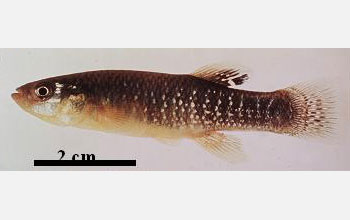News Release 04-150
Salt-Water Fish Research Helps Explain Human Cardiology Puzzle

Research on this fish is providing scientists with new information about how animals metabolize ...
December 2, 2004
This material is available primarily for archival purposes. Telephone numbers or other contact information may be out of date; please see current contact information at media contacts.
Arlington, Va.—Doctors and their patients have puzzled over why certain cholesterol-lowering drugs work better in some people than others. In research results published in the December issue of the journal Nature Genetics, the killifish helps provide an answer.
Researchers Douglas Crawford and Jennifer Roach of the University of Miami's Rosenstiel School of Marine and Atmospheric Science (RSMAS) and Marjorie Oleksiak of North Carolina State University studied the genetic make-up of the fish and found that normal differences in how their heart muscles process fats and sugars contain clues to this mystery. The National Science Foundation (NSF)'s biocomplexity in the environment program, and biological oceanography program, funded the work.
"These scientists found a genetic set of keys that begins to unlock the mystery of why certain people can eat fatty foods and not suffer from heart disease, and why some medical treatments work more effectively in some people than in others," said Philip Taylor, director of NSF's biological oceanography program. "This far-reaching research is a result of NSF's investment in the use of genetics as a way of understanding how organisms adapt to their environments."
Some hearts, it turns out, use glucose (sugar) better than others. Some use fatty acids (fats) better. In general, if an individual is good at using or metabolizing one source, he or she is not good at using the other.
Using technology known as gene microarrays, the scientists were able to measure how the products of genes make proteins that in turn convert food sources into energy. They found a large variation from individual to individual in the number of genes associated with functions related to sugar and fat metabolism. Those differences explain much of the variation in cardiac metabolism of both sugar and fat, the researchers believe.
Surprisingly, the genes that matter most are not the same in each individual: in some, increases in certain genes affect the use of fats, while in others, they affect the use of sugars.
"This is an important first step in understanding why some of us can eat fatty foods and not suffer from cardiac disease," said Crawford, "and why some drugs or medical treatments work on some individuals but not on others."
Ultimately, the scientists think, their work could point the way toward identifying the number and type of certain genes a person has. With this information, doctors may be able to prescribe the most effective medication within a certain class of drugs to treat high cholesterol or blood sugar, and have a clearer understanding of an individual's propensity for heart disease.
The research was also funded by the National Institutes of Health's National Heart, Lung and Blood Institute.
-NSF-
Media Contacts
Cheryl L. Dybas, NSF, (703) 292-8070, email: cdybas@nsf.gov
Program Contacts
Phillip R. Taylor, NSF, (703) 292-8582, email: prtaylor@nsf.gov
The U.S. National Science Foundation propels the nation forward by advancing fundamental research in all fields of science and engineering. NSF supports research and people by providing facilities, instruments and funding to support their ingenuity and sustain the U.S. as a global leader in research and innovation. With a fiscal year 2023 budget of $9.5 billion, NSF funds reach all 50 states through grants to nearly 2,000 colleges, universities and institutions. Each year, NSF receives more than 40,000 competitive proposals and makes about 11,000 new awards. Those awards include support for cooperative research with industry, Arctic and Antarctic research and operations, and U.S. participation in international scientific efforts.
Connect with us online
NSF website: nsf.gov
NSF News: nsf.gov/news
For News Media: nsf.gov/news/newsroom
Statistics: nsf.gov/statistics/
Awards database: nsf.gov/awardsearch/
Follow us on social
Twitter: twitter.com/NSF
Facebook: facebook.com/US.NSF
Instagram: instagram.com/nsfgov


